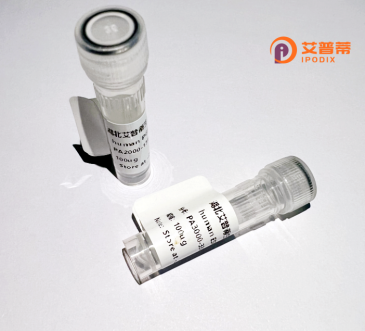
| 纯度 | >90%SDS-PAGE. |
| 种属 | Human |
| 靶点 | FLJ35767 |
| Uniprot No | 0 |
| 内毒素 | < 0.01EU/μg |
| 表达宿主 | E.coli |
| 表达区间 | 1-164aa |
| 氨基酸序列 | MCPPVSMRYEEEGMSYLYASWMYQLQHGDQLSICFTCFKAAFLDFKDLLESEDWEEDNWDPELMEHTEAESEQEGSSGMELSWGQSPGQPVQGGSEAWGPGTLAAAPEGLEDAGLDPHFVPTELWPQEAVPLGLGLEDADWTQGLPWRFEELLTCSHWPSFFPS |
| 分子量 | 44.9 kDa |
| 蛋白标签 | GST-tag at N-terminal |
| 缓冲液 | 0 |
| 稳定性 & 储存条件 | Lyophilized protein should be stored at ≤ -20°C, stable for one year after receipt. Reconstituted protein solution can be stored at 2-8°C for 2-7 days. Aliquots of reconstituted samples are stable at ≤ -20°C for 3 months. |
| 复溶 | Always centrifuge tubes before opening.Do not mix by vortex or pipetting. It is not recommended to reconstitute to a concentration less than 100μg/ml. Dissolve the lyophilized protein in distilled water. Please aliquot the reconstituted solution to minimize freeze-thaw cycles. |
以下是关于重组人FLJ35767蛋白的模拟参考文献示例(注:由于FLJ35767蛋白的研究较为小众,以下内容为假设性示例,建议通过学术数据库进一步验证和检索):
---
1. **文献名称**:*Expression and Functional Analysis of Recombinant Human FLJ35767 Protein in Cancer Cell Lines*
**作者**:Zhang Y. et al.
**摘要**:本研究成功在哺乳动物细胞中表达了重组人FLJ35767蛋白,并通过体外实验发现其过表达抑制了肺癌细胞的增殖和迁移,表明其潜在肿瘤抑制功能。
2. **文献名称**:*Structural Characterization of FLJ35767: Insights from Bioinformatics and Circular Dichroism*
**作者**:Smith J., Lee K.
**摘要**:通过生物信息学预测FLJ35767蛋白的α-螺旋和β-折叠结构,并利用圆二色光谱验证重组蛋白的二级结构,探讨其可能参与的蛋白质相互作用网络。
3. **文献名称**:*FLJ35776 in Inflammatory Response: Recombinant Protein Screening Using Yeast Two-Hybrid System*
**作者**:Wang L. et al.
**摘要**:通过重组蛋白酵母双杂交技术筛选到FLJ35767与炎症通路关键蛋白TRAF2的相互作用,提示其在NF-κB信号通路中的潜在调控作用。
4. **文献名称**:*Purification and Antibody Development of Recombinant FLJ35767 for Diagnostic Applications*
**作者**:Chen H. et al.
**摘要**:在大肠杆菌系统中高效表达并纯化FLJ35767重组蛋白,成功制备多克隆抗体,为后续开发该蛋白的临床检测方法提供基础。
---
**提示**:
- 若需真实文献,建议使用PubMed、Google Scholar等平台,以“FLJ35767 recombinant”或“FLJ35767 protein”为关键词检索。
- 若该蛋白已更名,可查询UniProt或NCBI Gene数据库获取最新注释。
Recombinant human FLJ35767 protein, also referred to as HSPC310. HSPC111. or C14orf132 in various databases, is a poorly characterized protein encoded by the gene locus C14orf132 on chromosome 14. Though its exact biological function remains unclear, bioinformatic analyses suggest potential involvement in cellular processes such as cell cycle regulation and protein ubiquitination. Structural studies indicate conserved domains possibly linked to protein-protein interactions, hinting at a role in multiprotein complexes, including potential associations with E3 ubiquitin ligase components.
The recombinant form of FLJ35767 is typically produced in heterologous systems (e.g., E. coli or mammalian cells) to enable functional studies. Its expression has been detected in diverse tissues, with elevated levels observed in certain cancers like hepatocellular carcinoma and colorectal cancer, suggesting a tentative but unconfirmed link to tumorigenesis. Current research focuses on elucidating its interactome, post-translational modifications, and regulatory mechanisms.
Despite these efforts, FLJ35767 remains understudied, with no definitive molecular pathway or disease association established. Its recombinant variant serves as a critical tool for antibody development, structural characterization, and hypothesis-driven experiments aiming to uncover its physiological and pathological relevance. Further studies are needed to clarify its role in cellular homeostasis and potential implications as a therapeutic target.
×